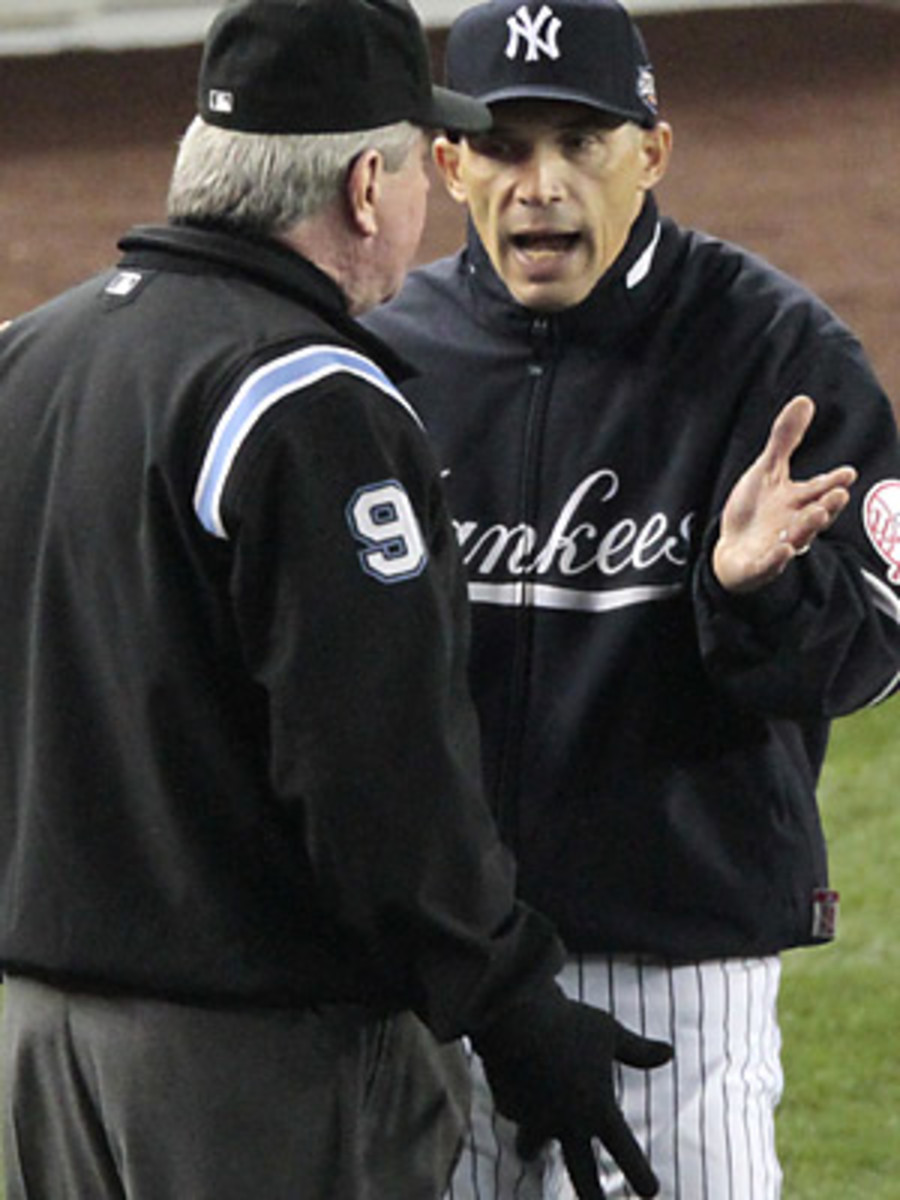Blown calls by umps are a problem, but one that can be easily solved
PHILADELPHIA -- The first two games of the World Series have been, refreshingly, about the players. We've seen the artistry of Cliff Lee and A.J. Burnett, the power of Chase Utley and Mark Teixeira, the grace under fire of Mariano Rivera. We haven't seen, for the most part, the fumbling by managers and stumbling by umpires that have been running themes this October.
This isn't to say that the men in blue have been perfect. On Wednesday night in New York, the six umpires huddled for several minutes confirming a call on the handling of a pop-up that they clearly got right the first time. In Thursday night's Game 2, two key close calls were apparently missed, a line drive trapped by Ryan Howard that was ruled a catch and a critical out at first base on Chase Utley on which he appeared to beat the throw on an inning-ending double play.
These plays shouldn't be added to the lowlight reel of October 2009, the one on which we see Phil Cuzzi with his arms raised, calling a fair ball foul, or C.B. Bucknor repeatedly and erroneously calling Howie Kendrick safe at first base, or Tim McClelland having arguably the worst postseason game of all time. No, the plays on Thursday night didn't call into question the competence of the umpires as individuals, but rather they showed that human umpires as a group are no longer the best technology for the job at hand. We know that first-base umpire Brian Gorman missed the calls of the Howard trap and the Utley play because we have technology that makes the case clear: high-definition cameras with frame-by-frame replay capability. We don't need to wonder any longer -- we can know whether the ball hit the glove before the foot hit the bag.
The "human element" so often cited when an umpire makes a critical error is a weak justification. The humans who should be deciding baseball games are the ones in uniforms, the ones the fans come to see. If a first baseman, such as Kevin Youkilis, tags a runner well before the runner reaches first base, that's an out. If a ball, like the one Joe Mauer hit in the Division Series, lands to the field side of a chalk line, it's in play. These are facts, and they shouldn't be mooted because a middle-management functionary -- and for all the mythology around them, that's what MLB umpires are -- made a mistake. The players, not the umpires, should determine the outcome of every play.
You fix this problem, and overcome inertia, with technology. Baseball should move to a system akin to that used in college football, in which every call is reviewed by an off-field umpire who is part of the crew. If there's a question, that umpire can ask for time and review the play. His word is final. This system would create jobs, 20 percent more, for umpires, and the jobs could serve as sinecures for veterans, the ones most likely to resist the use of replay. This system would cover everything but pitch calls; while these form the basis for most complaints about umpires, having a review of every pitch is impractical. Down the road, automated ball-and-strike calls are plausible, but the technology needs work before it can be an every-day solution for major-league games.
The most common objection to this system is that it would cause delays, but both pro and college football have survived, in part by selling additional television ads during the breaks. Delays would happen, but the improvement in accuracy, especially on high-leverage, high-profile plays, would be worth the time investment. You may even save time by eliminating the long arguments and conferences that currently occur.
MLB tried to address the problem of failing umpires by assigning veteran arbiters to the World Series, but the problem isn't the caliber of umpires, but the caliber of human eyes. No umpire could have made the call on the Howard play, because a well-positioned umpire would be screened by the player's body. Only a camera could have verified what occurred. These plays expressly illustrate that the problem isn't umpire skill, but the way in which cameras do what people cannot. We have much, much better technology for evaluating these plays, and to not use that because it'll take a few extra minutes, or because of some misguided allegiance to a romantic notion of baseball, or just because some people don't think it's worth it, is wrong.






